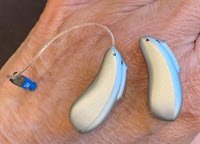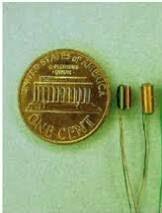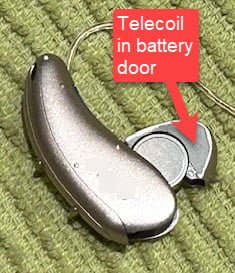Telecoils
Video “The Telecoil Explained” by Hearing Tracker (7:21)*
What are telecoils? Do I want one?
A telecoil increases the effectiveness of your hearing aid or cochlear implant.
A telecoil connects your hearing aid (wirelessly) to the public address system in the place you are visiting, via an assistive listening system. If you want to hear more clearly in public and private places, yes, you do want a telecoil in your hearing aids.

The telecoil can connect you to assistive listening systems in theaters, airports, places of worship, and thousands of other public spaces. Better still, a telecoil directly connects you to a hearing loop (if one is installed in the building you are visiting) without the need for additional Assistive Listening Device equipment–you simply switch your hearing aid or cochlear implant to telecoil mode (or T mode). Telecoils can also connect you to your home TV hearing loop (this website).
Audiologists and hearing instrument providers are responsible for providing devices that permit users to hear in as many places as possible, activating built-in telecoils, demonstrating the benefits of all features, and educating the user.
If your provider doesn’t bring the topic up, ASK.
Many people with hearing aids don’t know if their hearing aid has a telecoil or how to use it. Ask your audiologist or hearing instrument specialist if your hearing aid has a telecoil, make sure it’s activated, and ask for instruction in using your telecoil program.
If you’re considering buying hearing aids soon, make sure you consider telecoils before you buy. Some manufacturers use a “T” in the name to let you know the hearing aid has a telecoil. The Oticon Opn miniRITE T or Signia Pure Charge&Go T IX are examples.
Auracast™ and Telecoils
Auracast™ broadcast audio is a new Bluetooth® capability. For Auracast streamed assistive listening, there are no sites with this technology. The international standard is not finished (2027) and 99% of users do not have hearing instruments with Auracast. Read more about Auracast streamed assistive listening (this website)
To ensure access for all assistive listening systems, today and tomorrow, it is critical that both Auracast and telecoils be included in hearing instruments for at least the next decade and probably longer. People with hearing loss need both Bluetooth/Auracast AND telecoils in their hearing aids (this website) to fully participant anywhere and everywhere.
NEITHER should be optional: Consumers shouldn’t be forced to choose between Bluetooth/Auracast or telecoils, nor should professionals be forced to choose (because of the lack of products provided by the hearing aid MFRs) between models that offer only one or the other. Users require BOTH.

Tools
How the hyperlinks work:
- image or title -> opens a new webpage with more information
- download icon at bottom -> direct download
Choosing whether to include a telecoil
- Consumer Reports Buying Guide (webpage)
- Hearing Loss for Dummies, AARP Book, “The mighty telecoil” by Doctors Lin and Reed (webpage)
Classic Bluetooth and telecoils are different technologies and are designed for different situations.
- Classic Bluetooth helps you connect to personal devices such as your TV, smartphone, or tablet, but it has a limited range, and the technology in hearing instruments is often proprietary, not universal.
- The telecoil is universal and will boost your hearing and comprehension more effectively in thousands of public and private places around the world that have hearing loops, FM/RF, and infrared systems already installed.
- Auracast™ broadcast audio is a new Bluetooth® capability. For Auracast streamed assistive listening, there are no sites with this technology. The international standard is not finished (2027) and 99% of users do not have hearing instruments with Auracast. Read more about Auracast streamed assistive listening (this website)
Telecoils are a very inexpensive hearing aid component and does not inflate the cost of hearing aids.
See our webpage, how to use assistive listening systems (this website)
Telecoils are very small. Compare the photo of hearing aids: one with a telecoil and one without – they are about the same size…


A hearing aid without a telecoil is like a car without air conditioning. You don’t need it all the time, but when you do, you’re sure glad you have it!
Your use depends on your activities. You may use your telecoil every day at work or maybe you have a home hearing loop. Or perhaps you will use your telecoil whenever you attend religious services or events in the community.
Telecoils may be found in the following devices:
- Remote personal microphones
- Streamers
- OTOjOY LoopBuds (webpage)
- Other assistive devices, such as the WilliamsAV Pocketalker 2.0 and BeHear Access (webpages)
Articles
- Remote Mics + Hearing Aids = a Perfect Pair. S. Frazier. Hearing Health Foundation. March 23, 2023 (webpage)
- No Telecoils? No Problem. S. Frazier. Feb 2023 (4 pages, pdf)
10/16/24
After a transition period over the next two to three-and-a-half years, the FCC will require that all wireless handset manufacturers and service providers, both nationwide and regional, in the United States must offer products and services that allow for connectivity with prescription and over-the-counter (OTC) hearing aids and cochlear implant (CI) processors, as follows:
- 85% are able to connect to telecoils without interference
After 50 Years, 100% of Phones Will Soon be Hearing Aid Compatible (HAC), HLAA (webpage)
Working with a hearing aid provider to include telecoils
Most prescription hearing aids and all cochlear implants have telecoils in the device or in an accessory, such as a streamer or remote microphone.
OTC Hearing Aids. Only one OTC hearing aid has a telecoil, the Lexie Lumen (webpage)
- Article OTC Hearing Aids – Why No Telecoils? Article by S. Frazier. November 6, 2022 (webpage)
You will often need to ask. Sadly, many Audiologists and Hearing Instrument Specialists do not include telecoils or activate them in prescription hearing aids.
Legislation summary that includes counseling patients about telecoils in hearing instruments, assistive listening systems, or building standards (19 pages, pdf)
The best time to get a telecoil is during purchase. Depending on the hearing aid manufacturer, after manufacturing, you may be able to add a telecoil with an accessory (streamer or remote microphone) or sometimes the battery door can contain a telecoil.

Yes – but should be included at the time of order. Sometimes, the telecoil can sometimes be added (cost could be in the $100/$150 range) if the devices are still under warranty during the first and second year.
Resources
- “What is a hearing aid telecoil and why would I want one?” Healthy Hearing 2019 (webpage)
*At the end of the video, there is mention of hearing loop ‘weak’ areas. In response: “If you are using a loop system and find a “weak” spot – it may be that the installation of the Hearing Loop does not meet the international standard (IEC 60118-4 code) for coverage, and you should let the owner/manager of that space know you had difficulty. They will contact their loop installer for analysis and repair as needed. When installed properly, a loop field reaches every activated telecoil equally well.” Audio Directions (installer’s webpage) in comments.







